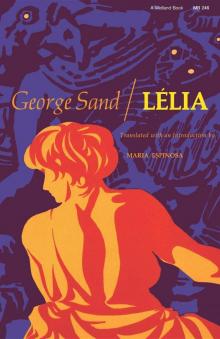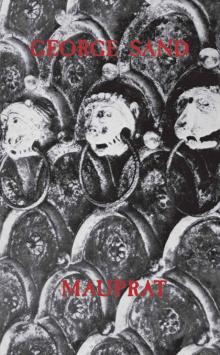- Home
- George Sand
Consuelo Page 4
Consuelo Read online
Page 4
Thus plotting, Anzoleto reached one of those little spots termed corti in Venice. Courts indeed they were not, but an assemblage of houses opening on a common space, corresponding with what, in Paris, is called cité. But there is nothing in the disposition of these pretended courts like the elegant and systematic arrangements of our modern squares. They are obscure spots, sometimes impassible, at other times allowing passage; but little frequented, and dwelt in by persons of slender fortune—laborers, workmen, or washerwomen, who stretch their linen across the road, somewhat to the annoyance of the passengers, who put up with it in return for permission to go across. Woe to the poor artist who is obliged to open the windows of his apartment in these secluded recesses, where rustic life, with its noisy unclean habits, reappears in the heart of Venice, not two steps from large canals and sumptuous edifices! Woe to him if silence be necessary to his occupation! for, from morn till night, there is an interminable uproar, with children, fowls, and dogs, screaming and playing within the narrow space, the chatter of women in the porches, and the songs of workmen, which do not leave him a moment of repose. Happy, too, if Improvisatori do not bawl their sonnets till they have gathered a coin from every window; or Brighella do not fix her station in the court, ready to begin her dialogue afresh with the avocato, "Il tedesco e il diavolo," until she has exhausted in vain her eloquence before the dirty children—happy spectators, who do not scruple to listen and to look on, although they have not a farthing in their possession.
But at night, when all is silent, and when the quiet moon lights up the scene, this assemblage of houses of every period, united to each other without symmetry or pretension, divided by deep shadows full of mystery in their recesses, and of a wild spontaneous beauty, presents an infinitely picturesque assemblage. Every thing is beautiful under the light of the moon. The least architectural effect assumes force and character, and the meanest balcony, with its clustering vine, reminds you of Spain and of romantic adventures with the cloak and sword. The clear atmosphere in which the distant cupolas rising above the dark mass are bathed, sheds on the minutest details of the picture a vague yet harmonious coloring, which invites one to reveries without end.
It was in the Corte Minelli, near the church of San Fantin, that Anzoleto found himself when the clocks of the different churches tolled the hour of two. A secret instinct had led his devious steps to the dwelling of one of whom he had not thought since the setting of the sun. Hardly had he entered the court, when he heard a sweet voice call him by the last syllables of his name; and raising his head he saw for an instant a faint profile shadow itself on one of the most miserable abodes of the place. A moment afterward a door opened, and Consuelo, in a muslin petticoat and wrapped in an old black silk mantle, which had served as adornment for her mother, extended one hand to him, while at the same time she placed her finger on her lip to enforce silence. They crept up the ruined stair, and, seated at length on the terrace, they began one of those long whispering conversations, interrupted by kisses, which one hears by nights along the level roofs, like the converse of wandering spirits wafted through the mist, amid the strange chimneys hooded with red turbans of all the houses of Venice.
"How, my poor friend!" said Anzoleto; "have you waited for me until now?"
"Did you not say you would give me an account of the evening, and tell me if you sang well—if you afforded pleasure—if they applauded you—if they signed your engagement?"
"And you, my best Consuelo," said Anzoleto, struck with remorse on seeing the confidence and sweetness of this poor girl, "tell me if my long absence has made you impatient—if you are not tired—if you do not feel chill on this cold terrace—if you have already supped—if you are not angry with me for coming so late—if you are uneasy—if you found fault with me."
"No such thing," she replied, throwing her arms about his neck. "If I have been impatient, it was not with you; if I felt wearied—if I was cold—I am no longer so, since you are here. Whether I have supped or not I do not know; whether I have found fault with you?—why should I find fault with you?—if I have been disquieted?—why should I have been so?—if I have been angry with you?—never!"
"You are an angel!" said Anzoleto, returning her caress. "Ah, my only consolation! how cold and perfidious are all other hearts!"
"Alas! what has happened?—what have they done to the sun of my soul?" exclaimed Consuelo, mixing with the sweet Venetian dialect the passionate expressions of her native tongue.
Anzoleto told her all that had happened—even his moonlight sail with Corilla, and more especially the encouragement which she had held out to him; only he smoothed matters over somewhat, saying nothing that could vex Consuelo, since in point of fact he had been faithful—and he told almost all. But there is always some minute particle of truth on which judical inquiry has never thrown light—which no client has revealed to his advocate—which no sentence has ever aimed at except by chance—because in these few secret facts or intentions is the entire cause, the motive, the aim—the object in a word—of these great suits, always so badly pleaded and always so badly judged, whatever may be the ardor of the speakers or the coolness of the magistrate.
To return to Anzoleto. It is not necessary to say what peccadilloes he omitted, what emotions in public he translated in his own fashion, what secret palpitations in the gondola he forgot to mention. I do not think he even spoke of the gondola at all, and as to his flatteries to the cantatrice, why they were adroit mystifications by means of which he escaped her perilous advances without making her angry. Wherefore being unwilling, and I may add unable, to mention all the temptations which he had surmounted by his prudence and caution, why, dear lady reader, should the young rogue awaken jealousy in the bosom of Consuelo? Happily for the little Spaniard she knew nothing of jealousy. This dark and bitter feeling only afflicts souls that have greatly suffered, and hitherto Consuelo had been happy in her affection as she was good. The only thing that made a profound impression upon her was the severe yet flattering denunciation of Professor Porpora on the adored head of Anzoleto. She made him repeat all the expressions which the maestro had used, and when he had done so, pondered on them long and earnestly.
"My little Consuelo," said Anzoleto without remarking her abstraction, "it is horribly cold here. Are you not afraid of getting cold? Think, my dear, that our prospects depend much more upon your voice than upon mine."
"I never get cold," said she; "but you are so lightly dressed with your fine clothes. Here now, put on this mantle."
"What would you have me do with this fine bit of torn taffeta? I would rather take shelter for half an hour in your apartment.'
"'Tis well," said Consuelo, "but then we must not speak, the neighbors would hear us and we should be to blame. They are not ill-disposed; they see us together without tormenting me about it, because they know very well you do not come here at night. You would do better to sleep at home."
"Impossible! They will only open at daylight and there are still three hours to watch. See, my teeth chatter with the cold!"
"Well," said Consuelo getting up, "I shall let you into my room and return to the terrace, so that if any body should observe it, it will be seen there is nothing wrong."
She brought him into a dilapidated apartment, where under flowers and frescoes on the wall appeared a second picture, almost in a worse condition than the first. A large square bed with a mattress of seaweed, and a spotted muslin coverlet, perfectly clean but patched with fragments of every-imaginable color; a straw chair, a little table, an antique guitar, a filagree cross—the only wealth her mother had left—a spinet, a great heap of worm-eaten music, which Professor Porpora was kind enough to lend—such was the furniture of the young artist, daughter of a poor Bohemian, the pupil of a celebrated master, and the beloved of a handsome adventurer. As there was but one chair, and as the table was covered with music, there was no seat for Anzoleto but the bed, on which he placed himself without hesitation. Hardly was he seated, when, overwhelmed wit
h fatigue, his head fell upon the woollen cushion which served as a pillow; but almost immediately, starting up again by a violent effort, he exclaimed:
"And you, my poor girl, are you going to take no rest? Ah! I am a wretch—I shall go and lie in the streets."
"No," said Consuelo, gently thrusting him back—"you are ill and I am not. My mother died a good Catholic; she is now in heaven, and sees us at this very hour. She knows you have kept the promise you made to her, never to abandon me. She knows that our affection has been pure since her death as before. She sees at this moment that I neither do nor think what is wrong—that her soul may repose in the Lord!" And here Consuelo made the sign of the cross. Anzoleto already slumbered. "I am going to tell my beads," continued Consuelo, moving away, "that you may not take the fever."
"Angel that you are!" faintly murmured Anzoleto, and he did not even perceive that he was alone. She had gone in fact to the terrace. In a short time she returned to assure herself that he was not ill, and, finding that he slept tranquilly, she gazed long and earnestly at his beautiful face, as it lay lighted by the moon.
Then, determined to resist drowsiness herself, and finding that the emotions of the evening had caused her to neglect her work, she lighted the lamp, and, seated before the little table, she noted a composition which Master Porpora had required of her for the following day.
CHAPTER VI
THE Count Zustiniani, notwithstanding his philosophical composure, was not so indifferent to the insolent caprices of Corilla as he pretended. Good-natured, weak, frivolous, Zustiniani was only a rake in appearance and by his social position. He could not help feeling at the bottom of his heart the ungrateful return which this insolent and foolish girl had made to his generosity; and though at that period it was considered the worst possible taste, as well at Venice as at Paris, to seem jealous, his Italian pride revolted at the absurd and miserable position in which Corilla had placed him. So, the same afternoon that had seen Anzoleto shine at the Palazzo Zustiniani, the count, after having laughed with Barberigo over the tricks of Corilla, his saloons being emptied and the wax-lights extinguished, took down his cloak and sword, and, in order to ease his mind, set off for the palazzo inhabited by the poor singer.
He found that she was alone, but still ill at ease, he began to converse in a low voice with the barcarole who was mooring the gondola of the prima donna under the arch reserved for that purpose, and, by virtue of a few sequins, he easily convinced himself that he was not mistaken, and that Corilla had not been alone in the gondola; but who it was that had accompanied her he could not ascertain—the gondolier knew not. He had met Anzoleto a hundred times in the passages of the theater, or near the Palazzo Zustiniani, but failed to recognize him when powdered and in his dark attire.
This inscrutable mystery completed the count's annoyance. He consoled himself with ridiculing his rival, the only vengeance which good breeding permitted, and not less cruel in a gay and frivolous age than murder at more serious periods. He could not sleep; and at the hour when Porpora began his instructions, he set out for the Scuola di Mendicanti, and the hall where the young pupils were wont to assemble.
The position of the count with regard to the learned professor was for some years past much changed. Zustiniani was no longer the musical antagonist of Porpora, but in some sort his associate and leader. He had advanced considerable sums to the establishment over which the learned maestro presided, and out of gratitude the directors had invested him with the supreme control. The two associates then were as good friends as could be expected from the intolerance of the maestro with regard to the music in vogue—an intolerance, however, which was considerably softened by the assistance and resources lavished by the count in behalf of the propagation of serious music. Besides, the latter had brought out at San Samuel an opera which the maestro had written.
"My dear master," said Zustiniani, drawing Porpora aside, "you must not only give me one of your pupils for the theater, but say which of them is best calculated to replace Corilla. That artist is wearied, her voice has decayed, her caprices ruin us, and the public will be disgusted. Truly we must obtain a succeditrice." Pardon, dear reader, for this was said in Italian, and the count made no mistake.
"I have not got what you require," replied Porpora, drily.
"What! my dear maestro," exclaimed the count, "you are not going to fall back into your dark moods? Is it after all the sacrifices and all the devotion which I have manifested toward you, that you are going to deny me a slight favor when I ask your assistance and advice in my own behalf?"
"I would not be justified in granting it," replied the professor, "and what I have just said is the truth, told you by a friend, and with the desire to oblige you. I have not in my school a single person capable of replacing Corilla. I do not estimate her higher than she deserves; yet in declaring that the talent of this girl has no real worth in my eyes, I am forced to acknowledge that she possesses an experience, a skill, a facility, and a sympathy with the public, which can only be acquired by years of practice, and which could not be attained by other début antes for a long time."
"That is true," said the count; "but we made Corilla, we saw her begin, we procured the approbation of the public; her beauty gained her three-fourths of her success, and you have individuals equally agreeable in your school. You cannot deny that, master. Come, admit that Clorinda is the most beautiful creature in the universe."
"Yes, but saucy, mincing, insupportable. The public perhaps may find her grimaces charming—but she sings false, she has neither soul nor intelligence. It is true that the public has only ears; but then she has neither memory nor address, and she could only save herself from condemnation by the happy charlatanism that succeeds with so many others."
Thus saying, the professor cast an involuntary glance upon Anzoleto, who, under favor of the count, and on pretense of listening to the class, had kept a little apart, attending to the conversation.
"It matters not," said Zustiniani, who heeded little the master's rancor; "I shall not give up my project. It is long since I have heard Clorinda. Let her come with five or six others, the prettiest that can be found. Come, Anzoleto," said he, smiling, "you are well enough attired to assume the grave air of a young professor. Go to the garden and speak to the most striking of these young beauties, and tell them that the professor and I expect them here."
Anzoleto obeyed, but whether through malice or address, he brought the ugliest, so that Jean Jacques might have said for once with truth, "Sofia was one-eyed, and Cattina was a cripple."
This quid pro quo was taken in good part; and after they had laughed in their sleeves, they dismissed them, in order to send those of their companions whom the professor named. A charming group soon made their appearance, with Clorinda at their head.
"What magnificent hair!" exclaimed the count, as the latter passed him with her superb tresses.
"There is much more on than in that head," said the professor, without deigning to lower his voice.
After an hour's trial the count could stand it no longer, but with courteous expressions to the young ladies, retired full of consternation, after saying in the professor's ear, "We must not think of these cockatoos!"
"Would your Excellency permit me to say a word respecting the subject which occupies you," said Anzoleto in a low voice to the count as they descended the steps.
"Speak," said the count; "do you know this marvel whom we seek?"
"Yes, Eccellenza."
"In what sea will you fish up this precious pearl?"
"At the bottom of the class, where the jealous Porpora placed her on the day when you passed your female battalion in review."
"What! is there a diamond in the school whose splendor has never reached my eyes? If Master Porpora has played me such a trick——"
"Illustrious, the diamond of which I speak is not strictly part of the school; she is only a poor girl who sings in the choruses when they require her services, and to whom the professor gives lesso
ns partly through charity, but still more from love of his art."
"In that case her abilities must be extraordinary, for the professor is not easily satisfied, and is no way prodigal of his time and labor. Could I have heard her perchance without knowing it?"
"Your Excellency heard her long ago when she was but a child. Now she is a young woman—able, studious, wise as the professor himself, and capable of extinguishing Corilla on the first occasion that she sings a single air beside her in the theater."
"Does she never sing in public? Did she not sing sometimes at vespers?"
"Formerly, your Excellency, the professor took pleasure in hearing her sing in the church; but since then the scolari, through jealousy and revenge, have threatened to chase her from the tribune if she reappears there by their side."
"She is a girl of bad conduct then?"
"Oh Heavens! she is a virgin, pure as the newly fallen snow! But she is poor and of mean extraction—like myself, Eccellenza, whom you yet deign to elevate by your goodness—and these wicked harpies have threatened to complain to you of bringing into their class a pupil who did not belong to it."
"Where can I hear this wonder?"
"Let your Highness order the professor to make her sing before you, and you can then judge of her voice and the amount of her talent."

 Lelia
Lelia Mauprat
Mauprat Valentine
Valentine The Countess von Rudolstadt
The Countess von Rudolstadt Laura
Laura Indiana (Oxford World's Classics)
Indiana (Oxford World's Classics)